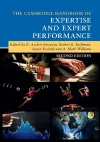
The Cambridge Handbook of Expertise and Expert Performance
4 contributors - Paperback
£56.99
K. Anders Ericsson is currently the Conradi Eminent Scholar and Professor of Psychology at Florida State University. He is also a Fellow of the Center for Advanced Study in the Behavioral Sciences, the American Psychological Association, the Association for Psychological Science, and a member of the Royal Swedish Academy of Engineering Sciences. His research has been featured in cover stories in Scientific American, Time, Fortune, the Wall Street Journal and the New York Times. He has been invited to give keynote presentations at conferences of surgeons, musicians, teachers, clinical psychologists, athletes, and coaches as well as professional sports organizations, such as the Philadelphia Eagles, the San Antonio Spurs, and Manchester City. Robert R. Hoffman is a recognized world leader in cognitive systems engineering and human-centered computing. Currently he is senior research scientist at the Institute for Human and Machine Cognition in Pensacola. He is a fellow of the Association for Psychological Science, fellow of the Human Factors and Ergonomics Society, senior member of the Association for the Advancement of Artificial Intelligence, and a Fulbright scholar. His Ph.D. is in experimental psychology from the University of Cincinnati. His Postdoctoral Associateship was at the Center for Research on Human Learning at the University of Minnesota. He also served on the faculty of the Institute for Advanced Psychological Studies at Adelphi University, New York. Hoffman has been recognized internationally in psychology, remote sensing, human factors engineering, intelligence analysis, weather forecasting, and artificial intelligence – for his research on the psychology of expertise, the methodology of cognitive task analysis, HCC issues for intelligent systems technology, and the design of macrocognitive work systems. Aaron Kozbelt is Professor of Psychology at Brooklyn College and the Graduate Center of the City University of New York. His research focuses on creativity and cognition in the fine arts, with an emphasis on perception in visual artists, lifespan creativity in composers, and evolutionary aspects of aesthetics and creativity. He has published more than 80 peer-reviewed articles and book chapters, and his research has been funded by the National Science Foundation. He serves on several editorial boards and has received several national and international awards for his research, including the Daniel Berlyne Award from Division 10 of the American Psychological Association and the Alexander Gottlieb Baumgarten Award from the International Association of Empirical Aesthetics. Andrew Mark Williams is Professor and Chair of the Department of Health, Kinesiology, and Recreation at the University of Utah. He is a fellow of the British Psychological Society, the British Association of Sport and Exercise Science, and the European College of Sports Science. His research interests focus on the neural and psychological mechanisms underpinning the acquisition and development of perceptual-cognitive and perceptual-motor skills. He has published over 300 journal articles and book chapters, and has written or edited 15 books. He is Editor-in-Chief for the Journal of Sports Science and sits on the editorial boards of several prominent journals. His research has been funded by research councils in Australia and the UK, by industrial partners such as Nike, and by several professional sports teams and national and international governing bodies.